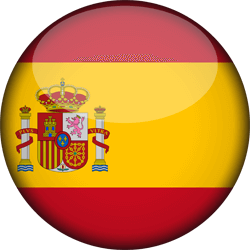
This image has format transparent PNG with resolution 250x250.
You can download this image in best resolution from this page and use it for design and web design.
Spain PNG with transparent background you can download for free, just click on download button.
Spain (Spanish: España [esˈpaɲa] (About this soundlisten)), officially the Kingdom of Spain (Spanish: Reino de España), is a European country located in Southwestern Europe with some pockets of Spanish territory across the Strait of Gibraltar and the Atlantic Ocean. Its continental European territory is situated on the Iberian Peninsula. Its territory also includes two archipelagoes: the Canary Islands off the coast of Africa, and the Balearic Islands in the Mediterranean Sea. The African enclaves of Ceuta, Melilla, and Peñón de Vélez de la Gomera make Spain the only European country to have a physical border with an African country (Morocco). Several small islands in the Alboran Sea are also part of Spanish territory. The country's mainland is bordered to the south and east by the Mediterranean Sea except for a small land boundary with Gibraltar; to the north and northeast by France, Andorra, and the Bay of Biscay; and to the west and northwest by Portugal and the Atlantic Ocean.
With an area of 505,990 km2 (195,360 sq mi), Spain is the largest country in Southern Europe, the second largest country in Western Europe and the European Union, and the fourth largest country in the European continent. By population (about 47 million), Spain is the sixth largest in Europe and the fifth in the European Union. Spain's capital and largest city is Madrid; other major urban areas include Barcelona, Valencia, Seville, Málaga and Bilbao.
Modern humans first arrived in the Iberian Peninsula around 35,000 years ago. Iberian cultures along with ancient Phoenician, Greek, Celtic and Carthaginian settlements developed on the peninsula until it came under Roman rule around 200 BCE, after which the region was named Hispania, based on the earlier Phoenician name Sp(a)n or Spania. At the end of the Western Roman Empire the Germanic tribal confederations migrated from Central Europe, invaded the Iberian peninsula and established relatively independent realms in its western provinces, including the Suebi, Alans and Vandals. Eventually, the Visigoths would forcibly integrate all remaining independent territories in the peninsula, including Byzantine provinces, into the Kingdom of Toledo, which more or less unified politically, ecclesiastically and legally all the former Roman provinces or successor kingdoms of what was then documented as Hispania.
In the early eighth century the Visigothic Kingdom fell to the Muslim of the Umayyad Islamic Caliphate, who arrived to rule most of the peninsula in the year 711, leaving only a handful of small Christian realms in the north and lasting up to eight centuries in the Kingdom of Granada. This led to many wars during a long reconquering period across the Iberian Peninsula, which led to the creation of Kingdom of Leon, Kingdom of Castille, Kingdom of Aragon and Kingdom of Navarre as the main Christian kingdoms to face the invasion. Following the establishment of Al-Andalus, Europeans began a gradual process of retaking the region known as the Reconquista, which by the late 15th century culminated in the emergence of Spain as a unified country under the Catholic Monarchs. The end of Muslim rule in Spain occurred in 1492, the same year Christopher Columbus arrived in the New World.
In the early modern period, Spain ruled one of the largest empires in history which was also one of the first global empires, leaving a large cultural and linguistic legacy that includes +570 million Hispanophones, making Spanish the world's second-most spoken native language, after Mandarin Chinese. During the Golden Age there were also many advancements in the arts, with world-famous painters such as Diego Velázquez. The most famous Spanish literary work, Don Quixote, was also published during the Golden Age. Spain hosts the world's third-largest number of UNESCO World Heritage Sites.
Spain is a secular parliamentary democracy and a parliamentary monarchy, with King Felipe VI as head of state. It is a major developed country and a high income country, with the world's fourteenth largest economy by nominal GDP and sixteenth largest by purchasing power parity. It is a member of the United Nations (UN), the European Union (EU), the Eurozone, the Council of Europe (CoE), the Organization of Ibero-American States (OEI), the Union for the Mediterranean, the North Atlantic Treaty Organization (NATO), the Organisation for Economic Co-operation and Development (OECD), Organization for Security and Co-operation in Europe (OSCE), the Schengen Area, the World Trade Organization (WTO) and many other international organisations. While not an official member, Spain has a "Permanent Invitation" to the G20 summits, participating in every summit, which makes Spain a de facto member of the group.
In this clipart you can download free PNG images: Spain PNG images free download